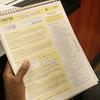Beth Kobliner appears in the following:
Paying for College
Tuesday, March 29, 2011


High school seniors across the country begin to receive their college acceptance letters this month, and many will be breathing a sigh of relief. Getting in is the hard part, right? But the process of paying for college is just as tough for many families – and it shouldn’t be an afterthought.
How to Fight Mortgage Discrimination
Wednesday, February 23, 2011


A recent report examining Federal Reserve data found that African Americans and Hispanics were able to borrow 62 percent less to buy or refinance homes in 2009 than in 2004 (pre-crash). Mortgage dollars going to white borrowers also declined, but only by 17 percent. Other research, including a powerful study of foreclosure rates and segregation by two Princeton scholars, suggests that black and Hispanic potential homeowners face discrimination and difficulty at every stage of the home-buying process. In effect, after decades of being denied loans at all and being neglected by traditional financial institutions, suddenly minorities were sold the worst loans out there. “Obviously it’s impossible to prove an individual institution is prejudiced, but collectively they were,” said the study’s co-author Jacob Rugh. “Communities were left out to dry.”
Home Loans to Minority Applicants Plunge
Wednesday, February 23, 2011
In the 1980s and 1990s banks avoided lending in minority neighborhoods and Blacks and Latinos were denied mortgages at disproportionately higher rates than equally credit-worthy whites. Redlining and mortgage discrimination was the norm. It seemed those days came to an end in the 2000s, when mortgage lenders began lending eagerly to anyone they could, and instead of being accused of avoiding minority borrowers, faced accusations of predatory lending in minority communities. However, now the tide has turned once again.
Ranking the Financial IQ of the World's Children
Tuesday, February 08, 2011
Remember that international exam last month that embarrassed a lot of Americans? The scores, you might recall, ranked U.S. children firmly below average in math and finally, after years, average at science. The test is called the Program for International Student Assessment exam, or PISA. And as it so happens, next year’s version of the PISA will feature a new section on financial literacy. But why financial literacy? And how well (or not well) will American kids do this next time around?
What do you think? Should kids be required to learn financial literacy? Why or why not? At what age do kids need to learn financial literacy?
Minimum Wage Increase Coming to Several States
Tuesday, January 11, 2011
This month, minimum wage workers in Arizona, Colorado, Montana, Ohio, Oregon, Vermont and Washington will see paycheck increases of three to 12 cents per hour. For those earning low wages, increases do help with living expenses, but is such a small raise really noticeable? We speak with Ashley Kinsinger, who has worked for minimum wage as a supermarket cashier, and Beth Kobliner, work contributor for The Takeaway about the issue.
Deconstructing Minimum Wage and 12-Cent Raises
Tuesday, January 11, 2011


On January 1, about 650,000 minimum wage workers in Arizona, Colorado, Montana, Ohio, Oregon, Vermont, and Washington saw their paychecks rise by up to 12 cents per hour. Who makes the minimum wage these days, and is it enough to live on?
Charitable Giving: Why We Do (and Don't) Toss a Buck in the Bucket
Tuesday, December 21, 2010
It’s the season of giving, when we’re all told that it’s better to give than receive. But if so, why don’t we all give to charities? And what would motivate us to give more? These are questions that Stephanie Brown explores. Brown, an Associate Professor of Medical Humanities, Compassionate Care, and Bioethics at Stony Brook University, has developed theories on why people give, and why they don’t.
'Tis the Season to Give ... Smartly
Tuesday, December 21, 2010


Beth Kobliner lists five things to remember if you are looking to give cash, stuff or time to charities this holiday season.
American Values: Home Ownership
Wednesday, December 15, 2010
Today, we continue our week-long series on American values with an examination of land and home ownership. The desire to own land — dating back to the notion of “Manifest Destiny,” as newly-minted Americans spread west across the continent — has always been considered a fundamental American value. How has our government and culture reinforced this value? And is it still as important to our identity as Americans as it was in the days when our motto was “Go West, Young Man”?
Is Homeownership Still an American Value?
Tuesday, December 14, 2010


The desire to own land — with the strong philosophical pull of “Manifest Destiny” — has always been considered a fundamental American value. How has our government and culture reinforced this value? Is it still as important to our identity as Americans as it was in the days when our motto was “Go West, Young Man”?
Can I Dump My Bank?
Monday, December 06, 2010


For as long as there have been banks, there have been people who have deliberately — or inadvertently — spurned them. With banks charging new fees, and the appearance of new tools for the unbanked, it might seem appealing. But is it really a smart move?
Outsmarting Black Friday Marketing
Friday, November 26, 2010
If Thanksgiving is a day for gratitude, Black Friday is a day for...sales! Right? Not so fast, says our personal finance contributor, Beth Kobliner. Last year, retailers were slashing prices by 80 or 90 percent, but she says bargains just aren't as big this year.
If it's the adrenalin rush of Black Friday shopping you're after, we've got some tips on how to stay sober while walking down the aisle. Our Golden Rule to follow: fifty percent off of something you don't need is not a deal.
Shopping Smart on Black Friday
Thursday, November 25, 2010


Today is Black Friday, and by all accounts it’s going to be one of the biggest shopping days of 2010. Store owners have you right where they want you: They’ve teased you with sales, you’ve been cooped up with your family for days, and now that Thanksgiving is over, it feels like the main reason we celebrate the holidays – to give and to receive – is upon us. Our entire culture is screaming “SHOP NOW!” But before you do that, take a deep breath and a look at some of the tricks retailers use to trap you into spending more than you’re prepared to. You don’t have to give up shopping altogether; just shop smart.
Delayed Dreams and Low Pay for the Malemployed
Tuesday, November 09, 2010
We all know the words unemployment and underemployment, but are you familiar with the term "malemployment?" Chances are, even if you don’t know the word, you know some who’s suffering through it. Malemployment, unlike underemployment, isn’t about workers having too little work. It’s about college degree holders working jobs that don’t require college degrees.
'Malemployment' on the Rise
Monday, November 08, 2010


You’ve heard of unemployment and underemployment. Now say hello to “malemployment,” when college graduates with limited job prospects are forced to take work that doesn’t require a college degree. According to new research from Andrew Sum, a professor of economics and the director of the Center for Labor Market Studies at Northeastern University, the problem is skyrocketing among recent graduates. Was all that tuition money a waste? And what can college grads who find themselves “malemployed” do to keep moving forward? (For more on the topic, see my New York Times piece here.)
Is it Time to Cut Your Aging Parents Loose?
Tuesday, October 26, 2010
We frequently talk about retired people living on limited budgets. But what about their adult children?
It turns out that many people with aging parents are struggling financially, and even facing professional setbacks. But are their sacrifices really for the best? And is there a time when they should just cut their aging parents loose to fend for themselves?
Boomers with Aging Parents
Monday, October 25, 2010


Baby Boomers are feeling the squeeze. They’re facing record-high unemployment rates, loss of home values, decrease of retirement investments, and now they’re also serving as caregivers to their won’t-grow-up kids AND their parents, who are living longer than ever. Meanwhile, the depressed housing market means it’s harder for their parents to sell their homes to afford medical care and assisted living, leaving their adult children with a serious and unexpected burden. What can stretched-too-thin Boomers do about it?
Surge in Landlords Causes Problems for Tenants
Tuesday, October 12, 2010
There’s so much focus put on homeowners and the problems they're facing in our current economic climate, but what about all the renters out there? There’s been a 10 percent increase in renters in the past five years according to the Census Bureau, and a whole new world of problems as landlords face the threat of foreclosure and instability. What are these issues? And what are a renter’s current rights?
Veterans Face Hurdles Returning to Workforce
Tuesday, September 28, 2010
The military ads we see on television often claim that enlisted men and women have the opportunity to gain valuable job skills while serving our country. Whether the dream is to be an engineer or a journalist, the promise is that the military can help that dream to come true. But are these promises real? And what do real veterans face when trying to find work?
What Does it Mean to be a Middle Class American?
Monday, September 27, 2010
For many years, an integral part of the American dream has involved making it to the middle class. We associate the phrase with steady, secure work, home ownership and providing for a comfortable — if not lavish — lifestyle for our family. But has middle class America fundamentally changed since the Great Recession hit? Do people that once saw themselves as solidly middle class see themselves differently now?














